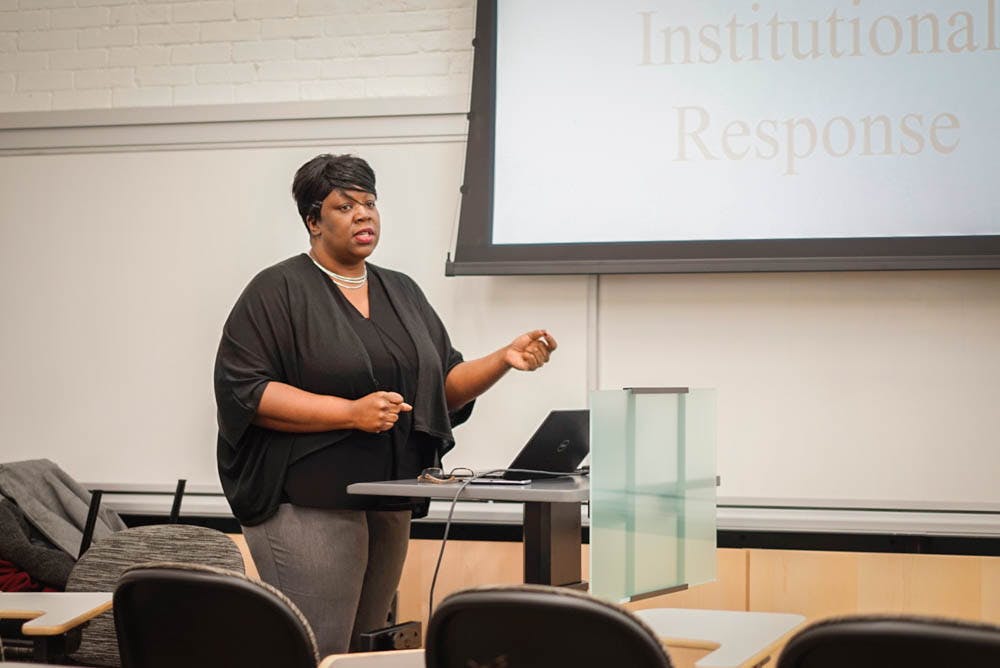The University released a community report Feb. 1 that summarized feedback and concerns from approximately 75 students, staff and faculty on the U.S. Education Department’s proposed changes to Title IX regulations.
Community members’ concerns included “the potential negative impact on the (Title IX) process,” and “the potential chilling effect on reporting and a reduction in the frequency of involvement by the Title IX office,” according to the report. Additionally, the community had questions regarding “the development of processes that are equitable to both parties,” and “the narrowing of instances in which universities must respond to a report of harassment.” Community members also showed interest in “holding members of the community accountable for off-campus incidents.”
The University gathered these responses through online comments and five information sessions held in December 2018, wrote Rene Davis, Title IX program officer, in an email to The Herald.
Title IX, which was passed in 1972, prohibits discrimination on the basis of sex in any academic environment or program that receives federal funding. Introduced last November, the Department’s proposed regulations would affect the implementation of Title IX through measures such as allowing “institutions to use a higher standard of proof in sexual misconduct cases,” as The Herald previously reported.
Guiding future University action
The community responses were shared with senior leaders who worked to develop the University’s comments on the proposed changes to Title IX regulations, Davis wrote. President Christina Paxson P ‘19 submitted a response on behalf of the University to recommend changes to the Department’s proposed regulations, The Herald previously reported. Paxson was one of 100,000 individuals who submitted public comments during the 60-day comment period.
In addition to administrators, responses garnered from Brown community members will be shared with the Steering Committee on Equity and Diversity, Davis wrote.
The SCED is responsible for “reviewing Title IX and gender equity matters that intersect with other forms of protected classes,” according to the Office of Institutional Equity and Diversity’s website. In this role, the group conducts a review of Title IX policies and procedures every three years. The next review of the University’s Sexual and Gender-Based Harassment, Sexual Violence, Relationship and Interpersonal Violence and Stalking Policy will take place this spring, Davis wrote.
Following the release of the final regulations, the Title IX and Gender Equity Office will work with the SCED to review any required changes to the University’s policy and procedure addressing reports of sexual violence and gender-based harassment, according to the community report.
Comprised of administrators and students, the SCED includes medical, graduate and undergraduate student representation, wrote Maggie U. Goddard GS, a former member of the now-disbanded Title IX Oversight and Advisory Board, in an email to The Herald.
As review of the University’s Title IX policies and procedures begins, including diverse viewpoints in the process will remain important, Davis wrote. “Perspectives from across the campus community have been instrumental in contributing to the University’s approach to these issues, and we expect that to continue moving forward,” she wrote.
In several areas, the Department’s proposed changes specify the process which institutions must use in addressing complaints of sexual misconduct. However, the University will not be able to assess the impact of the proposed changes on its policies and procedures until the release of the Department’s final rules, Davis wrote.
“The University is committed to keeping our community informed of the regulations as well as sustaining the community’s engagement in refining our policy and the related complaint procedures” following the release of the final regulations, Davis wrote.
Proposed changes prompt concern
While the University is not certain how the proposed changes will specifically affect sexual misconduct policy and procedure, there is concern among advocates that they will be harmful to survivors of sexual harassment and assault. Should the proposed regulations be enacted, those reporting sexual misconduct could unfairly bear the burden of proof in sexual misconduct cases, wrote Elliot Ruggles, a sexual harassment and assault resources and education advocate, in an email to The Herald. “If the proposed guidelines go into effect without changes, there is a strong message sent to survivors of sexual violence (including harassment) that the burden of proof is on them and that some experiences are more ‘valid’ than others,” Ruggles wrote.
These proposed changes could raise the likelihood of an “adversarial process while simultaneously decreasing the scope of what may be reported and investigated,” Ruggles added.
SHARE advocates are also concerned with regulations pertaining to cross-examination.
“Cross-examination may actually be less reliable than other more trauma-informed interviewing techniques, precisely because of the nature of traumatic memory creation and storage,” according to the Campus Advocacy and Prevention Professionals Association, a national organization of which the SHARE advocates are a member.
If the proposed revisions to Title IX regulations are finalized without changes considered from these public comments, the Department would be overlooking a democratic system which protects against inequitable regulations, Ruggles said. “There will be a disregard for the democratic process set up to ensure changes to significant legislation are not made unilaterally by any one government entity.”
For Ruggles, the proposed policy changes may ultimately harm students looking to report sexual misconduct. “These measures could further discourage survivors of harm from reporting and from participating in their school’s accountability process, and could disproportionately create additional barriers to safety for those students already most vulnerable to experiencing harm.”





